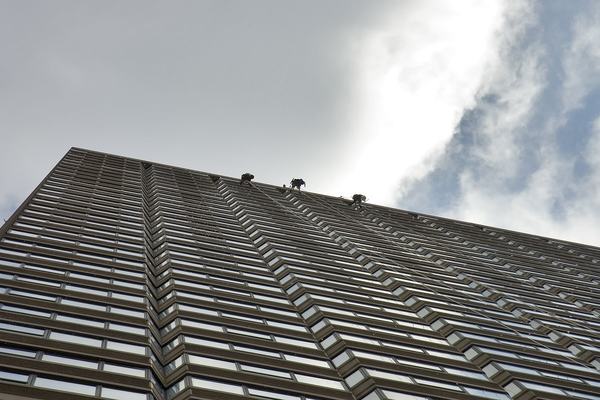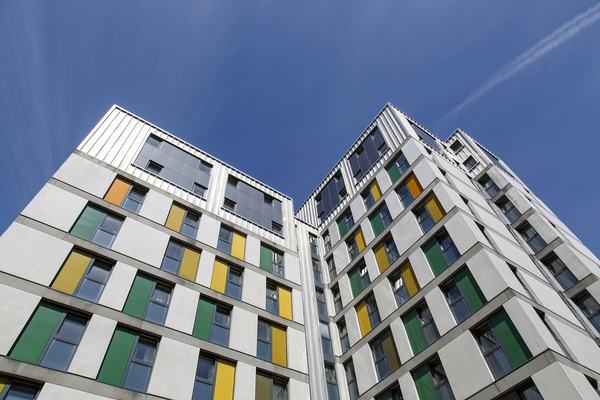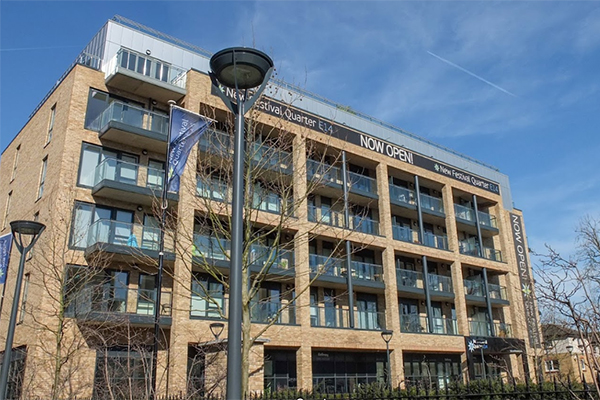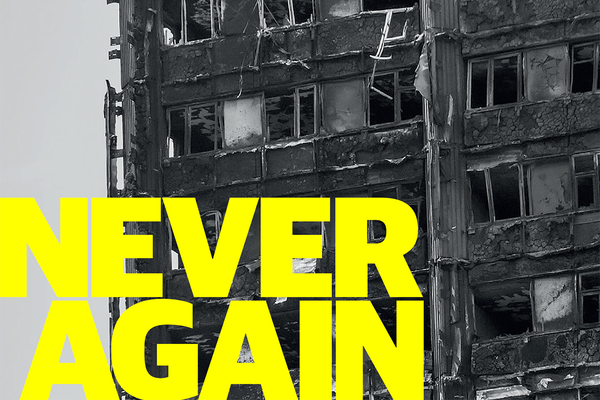You are viewing 1 of your 1 free articles
Developer blames ‘lack of government clarity’ for delay replacing Grenfell-style cladding
The owner of a development clad with Grenfell-style materials has said it is unable to start remediation work until it receives “absolute clarity” from the government on what materials it can use.
Developer Mace agreed to pay for the recladding of its £225m Greenwich Square development back in July and planned to start remediation work this year.
However, it has now said it cannot start work until the government publishes new guidance over what materials will be permitted for buildings.
A letter sent by Mace last month informed residents, which are a split between private leaseholders and L&Q shared owners, of the delay.
The letter, seen by Inside Housing, said: “In order to limit the risk of significant delays and disruption later on, we have made the difficult decision to delay the start of work until we have received absolute clarity from the government that our proposals will be permitted under the new rules.”
A spokesman for the company told Inside Housing it had made the “difficult decision” to hold off ordering the required material until it had seen the detail of the proposed government changes.
The government has responded by saying there is currently clear advice to all building owners about recladding of buildings.
A Ministry of Housing, Communities and Local Government spokesman said: “The government advice is clear and developers and building owners should not delay in replacing unsafe aluminium composite cladding.”
Housing secretary James Brokenshire confirmed in September the government would be introducing a ban on combustible materials on tall buildings, with the ban due to be brought in through changes to building regulations in the coming months.
The government has previously confirmed this will cover all materials rated below ‘A2’, a standard also known as ‘limited combustibility’.
The Mace spokesman added: “We are in regular contact with our residents and we will be discussing our plans with them in detail as soon as we are able to do so.”
Mace is the second developer to have delayed the start of remediation work, after work on the Citiscape tower block in Croydon was delayed earlier this year due to a lack of government guidance.
The building’s original developer Barratt agreed to cover the costs back in April but procurement for a contractor to carry out the work was paused.
FirstPort, which is managing the works at Citiscape, has said it had received sign-off for its materials from Mr Brokenshire in early October and had now picked a contractor for the work.
Latest government building safety figures revealed that only three private blocks out of 199 found to have ACM cladding since the Grenfell Tower fire have completed works, while remediation had started on 11 blocks.
So far only a handful of private developers have publicly stated that they would cover the costs of recladding work, including Mace and Barratt.
Insurance giant L&G was the first company to announce it would cover the costs of recladding on one of its buildings, when it confirmed it would pay for work on the Blenheim Centre in Hounslow last November.
The company told Inside Housing that it would be signing a contractor to carry out the works in the coming days ahead of work starting.
Taylor Wimpey, which announced it would be setting aside £30m in recladding provision in September, said it was yet to start work on any of its projects.
A spokesman for the company said: “While we are unable to go into detail about specific sites, we have in a small number of cases in light of the particular circumstances agreed to support former customers financially and practically with removal and replacement plans.
“This is a complex situation and it may take some time to make the necessary arrangements for ACM cladding replacement works to commence and complete, however interim measures are being maintained to ensure the residents remain safe in their homes.”
Never Again campaign
In the days following the Grenfell Tower fire on 14 June 2017, Inside Housing launched the Never Again campaign to call for immediate action to implement the learning from the Lakanal House fire, and a commitment to act – without delay – on learning from the Grenfell Tower tragedy as it becomes available.
One year on, we have extended the campaign asks in the light of information that has emerged since.
Here are our updated asks:
GOVERNMENT
- Act on the recommendations from Dame Judith Hackitt’s review of building regulations to tower blocks of 18m and higher. Commit to producing a timetable for implementation by autumn 2018, setting out how recommendations that don’t require legislative change can be taken forward without delay
- Follow through on commitments to fully ban combustible materials on high-rise buildings
- Unequivocally ban desktop studies
- Review recommendations and advice given to ministers after the Lakanal House fire and implement necessary changes
- Publish details of all tower blocks with dangerous cladding, insulation and/or external panels and commit to a timeline for remedial works. Provide necessary guidance to landlords to ensure that removal work can begin on all affected private and social residential blocks by the end of 2018. Complete quarterly follow-up checks to ensure that remedial work is completed to the required standard. Checks should not cease until all work is completed.
- Stand by the prime minister’s commitment to fully fund the removal of dangerous cladding
- Fund the retrofitting of sprinkler systems in all tower blocks across the UK (except where there are specific structural reasons not to do so)
- Explore options for requiring remedial works on affected private sector residential tower blocks
LOCAL GOVERNMENT
- Take immediate action to identify privately owned residential tower blocks so that cladding and external panels can be checked
LANDLORDS
- Publish details of the combinations of insulations and cladding materials for all high rise blocks
- Commit to ensuring that removal work begins on all blocks with dangerous materials by the end of 2018 upon receipt of guidance from government
- Publish current fire risk assessments for all high rise blocks (the Information Commissioner has required councils to publish and recommended that housing associations should do the same). Work with peers to share learning from assessments and improve and clarify the risk assessment model.
- Commit to renewing assessments annually and after major repair or cladding work is carried out. Ensure assessments consider the external features of blocks. Always use an appropriate, qualified expert to conduct assessments.
- Review and update evacuation policies and ‘stay put’ advice in the light of risk assessments, and communicate clearly to residents
- Adopt Dame Judith Hackitt’s recommended approach for listening to and addressing tenants’ concerns, with immediate effect
CURRENT SIGNATORIES:
- Chartered Institute of Housing
- G15
- National Federation of ALMOs
- National Housing Federation
- Placeshapers




